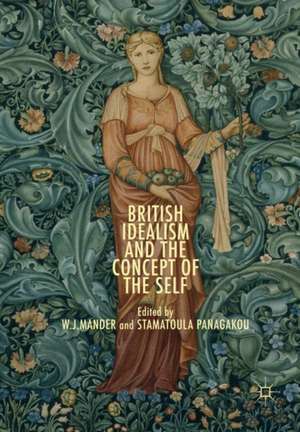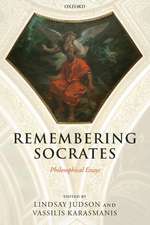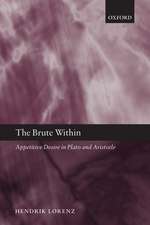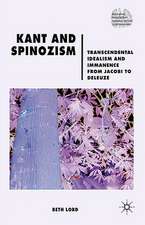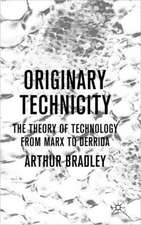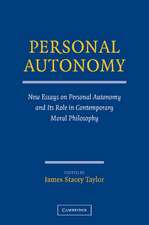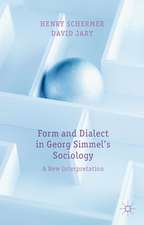British Idealism and the Concept of the Self
Editat de W. J. Mander, Stamatoula Panagakouen Limba Engleză Paperback – 24 aug 2023
| Toate formatele și edițiile | Preț | Express |
|---|---|---|
| Paperback (1) | 782.45 lei 6-8 săpt. | |
| Palgrave Macmillan UK – 24 aug 2023 | 782.45 lei 6-8 săpt. | |
| Hardback (1) | 786.81 lei 6-8 săpt. | |
| Palgrave Macmillan UK – 6 oct 2016 | 786.81 lei 6-8 săpt. |
Preț: 782.45 lei
Preț vechi: 954.21 lei
-18% Nou
Puncte Express: 1174
Preț estimativ în valută:
149.72€ • 156.72$ • 124.62£
149.72€ • 156.72$ • 124.62£
Carte tipărită la comandă
Livrare economică 01-15 aprilie
Preluare comenzi: 021 569.72.76
Specificații
ISBN-13: 9781349691111
ISBN-10: 1349691119
Pagini: 335
Ilustrații: XII, 335 p.
Dimensiuni: 148 x 210 mm
Greutate: 0.46 kg
Ediția:1st ed. 2016
Editura: Palgrave Macmillan UK
Colecția Palgrave Macmillan
Locul publicării:London, United Kingdom
ISBN-10: 1349691119
Pagini: 335
Ilustrații: XII, 335 p.
Dimensiuni: 148 x 210 mm
Greutate: 0.46 kg
Ediția:1st ed. 2016
Editura: Palgrave Macmillan UK
Colecția Palgrave Macmillan
Locul publicării:London, United Kingdom
Cuprins
1. Introduction: W. J. Mander and Stamatoula Panagakou.- 2. The Early British Idealists and the Metaphysics of the Self: Jenny Keefe.- 3. Metaphysics, Religion, and Self-Realization in F. H. Bradley: James W Allard.- 4. F.H.Bradley’s Conception of the Moral Self: a New Reading: Dina Babushkina.- 5. Self, Not-self, and the End of Knowledge: Edward Caird on Self-Consciousness: Phillip Ferreira.- 6. Dialectics of Self-Realization and Common Good in the Philosophy of T.H. Green: Janusz Grygieńć.- 7. Three Dimensions of T. H. Green’s Idea of the Self: Rex Martin.- 8. Bernard Bosanquet on the Ethical System of the State: Stamatoula Panagakou.- 9. The Moral Self and the Metaphysical Self in Bernard Bosanquet: William Sweet.- 10. ‘To set free the idea of the self’: Bosanquet’s Relational Individual: Avital Simhony.- 11. Collingwood’s Conception of Personhood and its Relation to Language Use: Ian Winchester.- 12. Collingwoodian Reflections on the Biographical Self: James Connelly.- 13. Renovating McTaggart’s Substantial Self: Gary L. Cesarz.- 14. Idealism and the True Self: W. J. Mander.- 15. Persons, Categories and the Problems of Meaning and Value: Leslie Armour.
Recenzii
“Its overall aim is not just to promote historical knowledge of British Idealism but also to promote idealism as a viable philosophical position. … they are rich in ideas and enjoyable to read. They will not fail to be inspirational to all those unsatisfied with contemporary ways of talking about the self.” (Pierfrancesco Basile, Journal of the History of Philosophy, Vol. 57 (3), July, 2019)
“This is an invigorating and valuable collection of papers, and the editors are to be complemented for their hard work in bringing it together from the initial conference. It will be a useful addition to a small but growing body of literature from a stalwart group of scholars, working in diverse ways on British Idealist philosophy.” (Andrew Vincent, Notre Dame Philosophical Reviews, ndpr.nd.edu, February, 2018)
“This book is recommended to those interested in a critical discussion of the philosophies of British Idealists as well as to a historical view andcontextualizing of their philosophical thought. It is warmly recommended to those interested in the connection and divergences between the philosophical thought of the same idealist philosopher in various disciplines as well as to those interested in the connection and divergences between the different philosophers.” (Flavia Felletti, metapsychology online reviews, metapsychology.mentalhelp.net, Vol. 21 (32), August, 2017
“British Idealism and the Concept of the Self is a good textbook for any class in English language studies that includes philosophy. The basic principles of participation in government by those governed are well set out. In these essays, authors from Greece, Finland, Poland, Canada, the United States, and the United Kingdom offer a variety of philosophical experience in the demanding disciplines of idealistic thinking.” (Alastair Beattie, Journal of Consciousness Studies, Vol. 24 (3-4), 2017)“This is an invigorating and valuable collection of papers, and the editors are to be complemented for their hard work in bringing it together from the initial conference. It will be a useful addition to a small but growing body of literature from a stalwart group of scholars, working in diverse ways on British Idealist philosophy.” (Andrew Vincent, Notre Dame Philosophical Reviews, ndpr.nd.edu, February, 2018)
“This book is recommended to those interested in a critical discussion of the philosophies of British Idealists as well as to a historical view andcontextualizing of their philosophical thought. It is warmly recommended to those interested in the connection and divergences between the philosophical thought of the same idealist philosopher in various disciplines as well as to those interested in the connection and divergences between the different philosophers.” (Flavia Felletti, metapsychology online reviews, metapsychology.mentalhelp.net, Vol. 21 (32), August, 2017
Notă biografică
W. J. Mander is Fellow in Philosophy at Harris Manchester College, Oxford, UK. As well as numerous articles on the history of British idealism, he has written two monographs: An Introduction to Bradley’s Metaphysics (1994) and British Idealism; a History (2012). Most recently, he has edited The Oxford Handbook of British Philosophy in the Nineteenth-Century (2014).
Stamatoula Panagakou teaches in the Department of Social and Political Sciences at the University of Cyprus. Her main area of interest is the philosophy of Bernard Bosanquet, on which she has published widely. She has also co-edited (with James Connelly) Anglo-American Idealism: Thinkers and Ideas (2010).
Stamatoula Panagakou teaches in the Department of Social and Political Sciences at the University of Cyprus. Her main area of interest is the philosophy of Bernard Bosanquet, on which she has published widely. She has also co-edited (with James Connelly) Anglo-American Idealism: Thinkers and Ideas (2010).
Textul de pe ultima copertă
This book reassesses the origins, development and legacy of the philosophy of the British idealists, demonstrating the enduring relevance of their thought for the modern discipline. This body of work coheres around the single unifying theme of the self – a concept of central importance to the idealist school. Particular attention is also paid to the many connections that hold between various philosophers and branches of philosophy, as well as creating a set of continuously running dialogues between contributing authors. Readers will discover a comprehensive, stimulating and sharply focused panorama of British idealist thought, which will be useful to philosophers, historians of ideas, political and social theorists, psychologists, and policy-makers who wish to gain a deeper understanding of the citizen as a self.
Caracteristici
Collects highly researched and insightful examinations of the cause, development and legacy of British idealism Elaborates upon the connections between various philosophers and branches of philosophy Speaks to those who wish to gain a deeper understanding of the citizen as a self
